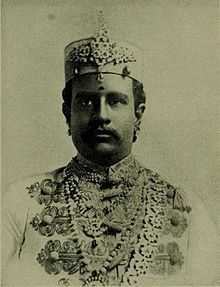Sethupathi
The Sethupathis (the guardian of the Isthmus of Rameswaram) were the rulers of the Ramnad and Sivaganga regions during the beginning of the 17th century.
Sethupathis of Ramand and Sivaganga
The rulers of Ramnad and Sivaganga region of early l7th Century were called Sethupathis. The Nayak ruler Muthukrishnappa Nayak appointed Sadaikkathever in 1605 as protector and guardian of the pilgrims to Sethusamudram and Rameswaram. The protector of Sethusamudram was called as Sethupathy. Sadaikkathevar was a loyal subordinate of the Nayaks. He emerged as the chiet of the poligas. Sethupathis were maravas of Ramnad, Madurai and Tirunelveli. They had Ramnad as their official headquarters. Sadaikkathevar and his son KuttanSethupathi acted as Sethupathis and extended protection to the pilgrims who visited Rameswaram. Apart from giving protection two Sethupathis did religious services to the Ramanathaswamy temple at Rameswaram.
Sadaikka Thevar
Sadaikka Thevar (1636 AD To 1645 )AD. Kuttan Sethupathi made his adopted son Sadaikkathevar II as the next ruler. This was opposed by Kuttan Sethupathi’s natural son Thambi, Thirumalai Nayak supported the claim of Thambi. The ruler Sadaikka thevar was dethroned and jailed. Thambi was made as Sethupathi. Thambi was not competent. Sadaikkathevar’s nephews Raghunathathevar and Narayanathevar rebelled against Thambi’s rule. Accepting the popular representation, Thirumalai Nayak released Sadaikkathevar from Jail and made him Sethupathi after dismissing Thambi from the throne Sadiakkathevar constructed a new Chokkanatha temple at Rameswaram. He did lot of Charitable and public works
Raghunatha Sethupathi
Raghunatha Sethupathi (1645 AD to 1670 AD) was loyal to the Nayak ruler. He helped the Nayaks by defeating the Muslims under Kutbkhan and the poliga of Ettapuram. In appreciation help the Novak ruler gave the privilege of celebrating Navarathri festival at the capital city. The Nayak ruler also donated places like Thirubhuvanam, Mannar Koil Tiruchuli to Sethupathi. He successfully annexed Devakottai and Aranthangi. He helped Thirumalai Nayak in his war against Mysore army. Thirumalai Nayak recognized the valuable military services of Raghunatha Sethupathi and conferred the title 'Thirumalai Sethupathi' on him. Sethupathis loyalty towards the Nayaks was over with Thirumalai Nayak.
Raghunatha Sethupathi recaptured all the forts and places from the Nayaks and became an independent ruler. Raghunatha Sethupathi patronized art and literature. He made Tamil and Telugu as official languages of his court. He encouraged Tamil poets namely Alagiya Chitramabala Kavirayar and Amirtha Kavirayar. He constructed the Second prakaram (outer courtyard) of the Ramanathswami temple in Rameswaram. The famous poet Thayumanavar spent his last days under the Patronage of Raghunatha Sethupathi. After Raghunatha Sethupathi both Surya thevar and Athana thevar were in power for a very short duration in 1670.
Raghunatha Sethupathi II alias Kizhavan Sethupathi
Kizhavan Sethupathi (1671 AD to 1710 AD) was the greatest ruler among the Marava kings. He was the seventh king of Ramnad.[1] He was helpful to Chokkanatha Nayak. The Nayak king conferred him a title Para Rajakesari (Lion to alien kings). He annexed some territories of Madurai Kingdom. Aranthangi, Thirumayam, Piranmalai. He opposed the spread of Christian missionary activities. Kizhavan Sethupathi liberated the Marava country from the control of Madurai Nayak. After defeating Rani Mangammal’s army, he declared independent Marava country in 1707. He shifted his headquarters from Pughalur to Ramnad. Kilavan Sethupathi established the Nalcottal palayam (later Sivaganga) and appointed Udaya Thevar as Governor. He served well for the development of Hinduism. He endowed villages to a temple at Thiruvadanai and Kalaiyar Koil. He constructed a fort around the Ramanathapuram, the capital city. He constructed a dam across the Vaigai. His rule was marked as the golden age of the Maravas. Kilavan Sethupathi was succeeded by Bhavani Shankarathevar and Thandathevar.
Post Kilavan Sethupathi
Vijayaraghunatha Sethupathi became the 8th King of Ramnad in 1710 after the death of Kilavan Sethupathy.[1][2] After Kilavan Sethupathi the kingdom was divided into two new Sivaganga Kingdom emerged. During the later period of Sethupathi’s rule, the Ramnad was reduced to a zamin level. Then it was brought under the control of the Britishers. Finally it became a part of the Indian Union. Among the later Sethupathis, Bhaskara Sethupathy was an exceptionally enlightened zamindar. He was an English educated ruler. He honored Swami Vivekananda who attended the parliament of Religion at Chicago. The social life under Sethupathi’s rule was good. At last Prince named Vigneshwara sethupathi is thought to be went in exile.[3]

References
- ↑ 1.0 1.1 "Sivaganga, Tamil Nadu".
- ↑ Suresh Kumar P S (3 August 2003). "Crumbling Glory". The Hindu.
- ↑ "Sethupathis of Ramand and Sivaganga". Retrieved 2009-08-30.